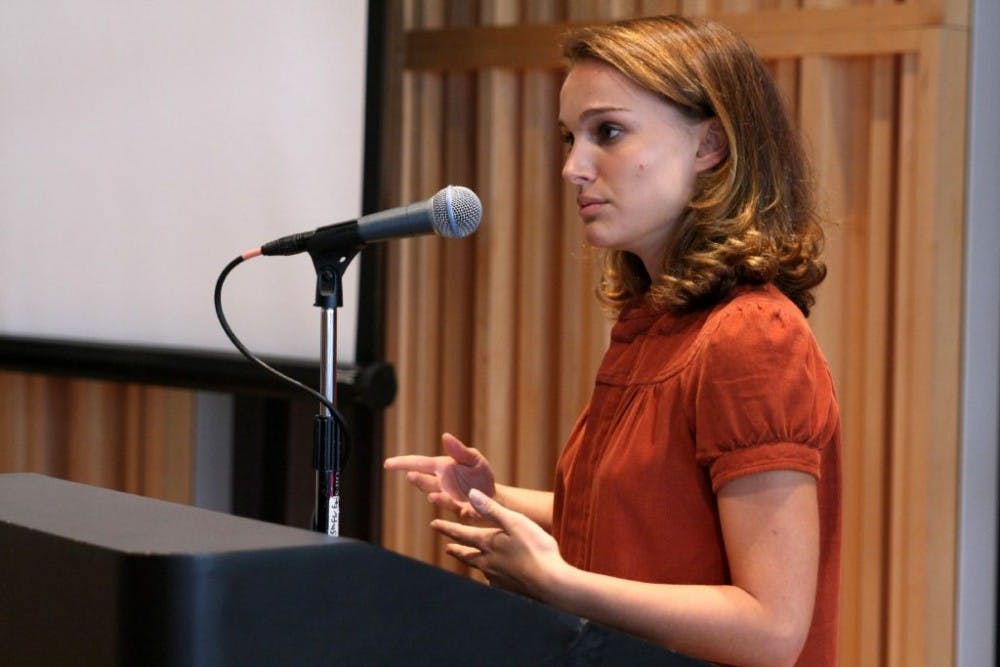A Tale of Love and Darkness is the directorial debut of Academy Award-winning actress Natalie Portman, who is a triple threat as the film’s star, director and screenwriter. The film is based on the early life of Amos Oz, a prominent modern Israeli novelist. The film depicts his life as a young boy living in Jerusalem with his mother and father during the founding years of the State of Israel. Portman was born in Israel and returned there for the setting of this film, which has a screenplay almost entirely in Hebrew.
Young Amos (Amir Tessler) lives in Jerusalem with his parents in the British Mandate of Palestine following the end of World War II. This land will later become the state of Israel. Amos is a quiet child, bookish like his parents, who adjusts to the stark realities of daily life in an embattled city. His mother, Fania (Portman), is a survivor of the Holocaust. She is a learned, yearning woman and the emotional center of the story while she tells tales to her young son. His father, Arieh (Gilad Kahana), is an academic and a failed writer, a man who cares deeply for his family but cannot offer comfort or solace to his stifled wife.
Fania fled to Israel with her family from a town in Poland, later Ukraine, where thousands of Jews, nearly everyone she knew, were murdered in the Holocaust. Fania tells her son stories, often macabre and always melancholy, of the small town where she and her sisters were raised, which all seem to inevitably end in tragic death. She vividly dreams of the pioneer of Israel, a brilliant, strapping and vigorous young man to represent the Zionist homeland. The crushing disappointments and brutal traumas of her life, coupled with severe depression, drive her to commit suicide at the age of 38.
Amos is the narrator of the film, and the young boy is a witness to the way in which history acts on both his family and his people. The disappointed dreams of his mother are also those of the people who had hoped that the new state could be founded and held without bloodshed, who find that turmoil and unrest continue to plague the region.
Perhaps the strongest scene within the film is an interaction between Amos and a young Palestinian girl, Aisha (Salina Daw). The pair shares a gentle, sweet conversation in which the two precocious children discuss Hebrew poetry. The scene feels more natural than some of the more stylized portions of the film, and the way in which the juvenile interaction becomes dark and violent is a sign of the rising tensions between Palestinian and Jewish adults.
A Tale of Love and Darkness is a quiet, intellectual film with few tears, preferring a literate, verbose sensibility over that of a weepy family melodrama. The film also avoids historical epic, remaining sparse in its depictions of violence and utilizing only a few reels of newsreel footage to create a sense of what was occurring outside the walls of the family’s home.
This film is perhaps is too elegantly made and too literary, so much so that Young Amos is often left to describe feelings and understandings that are more than evident to the viewer. This is most frustratingly evident in the scene where Young Amos attempts to explain his mother’s suicide in spirals of beautiful words that are made superfluous by Portman’s virtuoso performance. The viewer needs no words to see that Portman’s Fania has finally, tragically come undone, not when Portman has made the depths of the woman’s anguish and isolation clear.
A Tale of Love and Darkness reflects the thoughtfulness and seriousness with which Portman treats her subject matter. It is obvious that Portman connected with Oz’s memoir of the same name, on which the film is based. It took eight years for Portman to gain funding for the film and to complete the adaptation of the Hebrew script. The film is an earnest, reflective movie and certainly suggests that Portman has more films ahead of her.
Viewing this movie in theaters was a chance to support a film helmed by a female director. According to a 2015 study by the Center for the Study of Women in Television and Film at San Diego University, of the top 700 films released in 2014, only 13 percent were directed by women and an even lower percentage made by female directors of color. More and more women have been taking the opportunity to step into the director’s role. Portman’s film is one of several female-helmed films opening this fall, including Mira Nair’s Queen of Katwe, Amma Asante’s A United Kingdom and Dawn Porter’s Trapped. Hopefully, A Tale of Love and Darkness is a sign of future films will made by women, about them and their struggles, achievements and complex inner lives.





